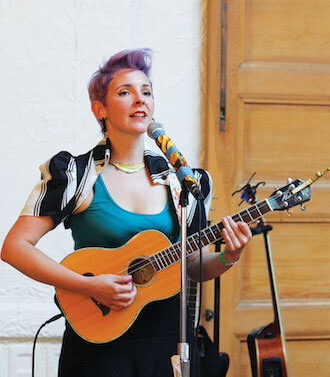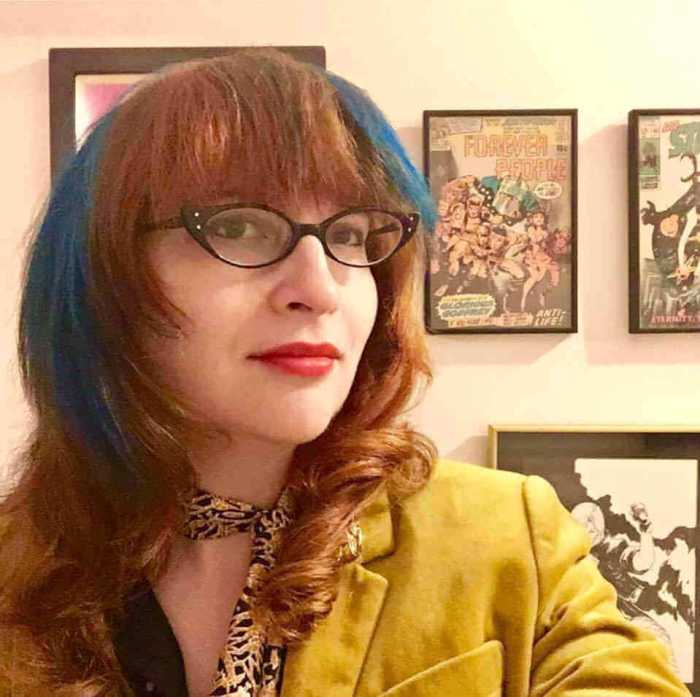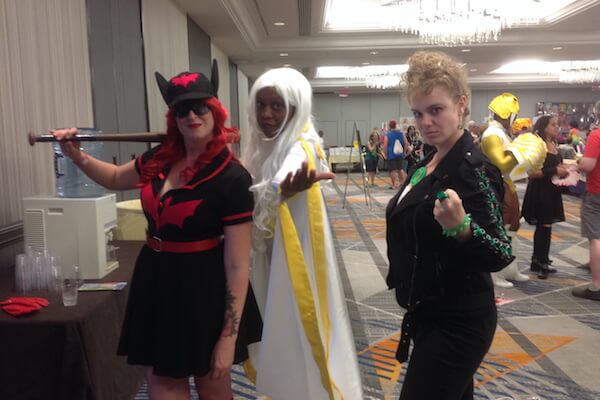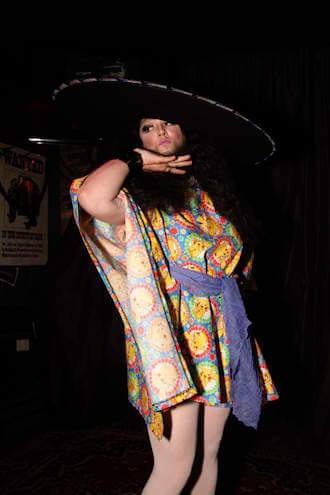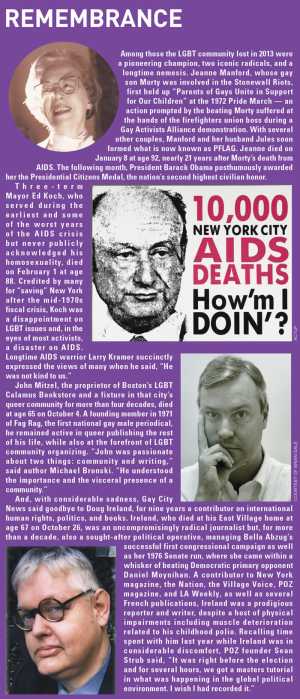Flame Con's mascot, Flamey, along with a handful of the many queer cosplayers. | MICHAEL SHIREY
BY MICHAEL SHIREY | It seems strange that an event like Flame Con — New York City’s first-ever queer comic convention — did not exist before now. But fear not — the folks at Geeks Out not only responded to the call, they delivered. And the unique Victorian splendor afforded by Brooklyn’s Grand Prospect Hall only added to what was a great experience for diehard fans and curious passersby alike.
More than 2,200 people showed up for the event on Saturday, June 13; organizers were perhaps wise to schedule it to coincide with the Brooklyn LGBT Pride Festival and Parade taking place just blocks away. In addition to special happenings that included a comically gay “X-Files” reading, musical performances, and a cosplay contest, there were more than 100 local and national exhibitors, along with 10 panels covering topics from queer diversity in youth comics and literature, to transgender- and female-themed comics, to queer characters in ultra-violence and horror genres.
New York’s first queer comic convention proves a smashing success
Cecil Baldwin and Dylan Marron kicked off Flame Con with a dramatic “X-Files” reading. | MICHAEL SHIREY
Embracing Queer Impulses
“Uber Violence and Queer Storytelling,” the first panel I attended, discussed queer characters in hyper-violent comics. Panelists included “Midnighter” writer Steve Orlando and “Bash Back” writers Lawrence Gullo and Kelsey Hercs. Orlando, whose first issue of the critically acclaimed “Midnighter” reboot has been selling out across the city, said it was a treat to explore the character’s queer life with a frank, “who gives a fuck if Midnighter is gay?” mentality. Orlando said he felt that sort of candidness squares with the character’s other traits. Approaching Midnighter’s sexuality as well as his violent tendencies in a matter-of-fact way, Orlando explained, allowed him to present a more holistic character than the original 1998 hero.
“Bash Back” is a queer mafia web comic written in response to growing reports of violence and crime against the LGBT community. In a wishful way, it explores the possibility of a hero or group of heroes who specifically defend the queer community. Taking full advantage of being self-published, “Bash” writers Gullo and Hercs completely did away with the “token straight character,” choosing instead to focus on characters who are transgender, bisexual, and people of color. The two joked about the allure of making all of the comic’s villains straight.
When asked if they were concerned about the backlash having such violent gay characters could have on LGBT representation in comics overall, Orlando swatted the question away with a joke, saying, “What does Wolverine being violent say about white Canadian guys?”
The next issue of “Midnighter” comes out in July, and you can check out “Bash Back” at bashback.tumblr.com
Tommy Heleringer, Krutika Mallikarjuna, Ian Carlos Crawford, and Nicole Gitau on “The Internet is Ghey” panel. | MICHAEL SHIREY
That’s Soo Ghey One of the last panels of the day was “The Internet is Ghey,” moderated by Geeks Out own Joey Stern and including his fellow Geeks Ian Carlos Crawford and Nicole Gitau, Buzzfeed’s Krutika Mallikarjuna, and actor Tommy Heleringer. Each has their own unique online presence. There was a nostalgic quality to their recalling the early days of chat rooms, online relationships, and meeting others digitally, and their comments about how the Internet has influenced their lives were fascinating. It became clear during the discussion that for some of the panelists (along with many in the audience, myself included) cyberspace was the first place they ever connected with the queer world.
For Mallikarjuna, now editor at Buzzfeed Geeky, the Internet was a place to “lurk” and marvel at fan art, which in time encouraged her to create her own fan fiction. Geeks Out member Gitau is a librarian — and so has all the Internet proficiency that career would suggest — but she voiced amazement at how no two people use it in the same way. She also said she is wary about the constant online access we have, saying that it does not necessarily make us smarter.
Heleringer also commented on the Internet’s downsides. Known by most in the room as Scruffy from “The Outs” web series, Heleringer distinguished between the relationship he has with fans of his theater work and the more direct, unfiltered connection he has with his Internet followers. His work on “The Outs” has elicited professions of love and proposals of marriage, and so, unlike others on the panel, Heleringer tries to keep as much of his personal life as possible off the Internet.
Sarah Donner serenaded the crowd with songs about cats and other mythical creatures. | MICHAEL SHIREY
In contrast, Crawford, a 20-something who uses social media liberally, emphasized his decision to not censor himself on the Internet. Having done work with Geeks Out and for Buzzfeed, he suggested he wouldn’t necessarily want to work for people who would be put off by his Internet persona. When he wrote a Geeks Out piece defending a recent Marvel storyline in which the character Iceman comes out as gay, Crawford was both called a faggot and accused of being bi-phobic. It was that second cut that stung. For him, one of the hardest lessons the Internet has taught him is that you cannot always change other people’s opinions.
The four panelists may have come to the Internet in very different ways — and each has their own specific relationship to it — but their discussion made clear that cyberspace has brought disparate parts of the queer community closer together. In perhaps a nod to the fact each of us has our own online life, the four offered amusingly varied answers when asked what was the gayest site on the Internet: for Mallikarjuna, it was Effing Dykes (effingdykes.blogspot.com); for Crawford, Twitter; for Gitau, Tumblr; and for Heleringer, any porn site.
Cons are exhausting, and between Flame Con and Brooklyn Pride, it was impossible for me to see everything.
Some of the other highlights from the event included “Secret Identities: Transgender Themes in Geek Culture,” which I was unable to attend (fortunately Charles Battersby was also on hand, and he provides coverage here). It was very clear, however, in the panels I was able to hit that Flame Con succeeded in drawing strong transgender participation and it also took seriously the ongoing issue of bisexual erasure.
My friend Kerry Cullen, who accompanied me throughout the day, once said she only felt comfortable in queer spaces, and even then it can be hard to fit into just the right clique. At Grand Prospect Hall on June 23, it was affirming to find out just how safe a space Flame Con was.
For more Geeks Out events, visit geeksout.org.

